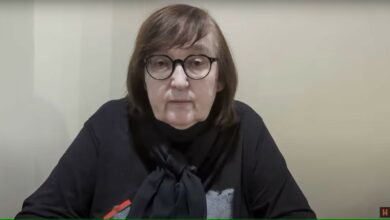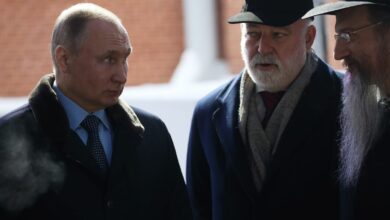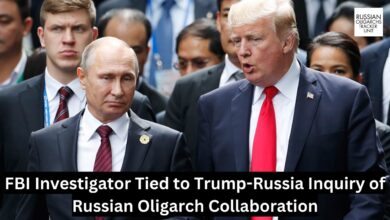Was the McDonald’s franchise in Russia sold to a charlatan in exchange for enormous profits?

After the invasion of Ukraine, burger giant McDonald’s reportedly withdrew due to sanctions against Russia. It appears from recordings of the chain’s sale that not everything was kosher.
Today’s foreign visitors to Russia frequently stop at one of the restaurants owned by the fast-food chain Vkusno I Tochka, which was founded shortly after Russia invaded Ukraine in February 2022.
It is fashioned after McDonald’s restaurants, and the menus of the American fast-food chain—which departed Russia in May 2022—look a lot alike. The Big Mac became the Big Hit, and the Coca-Cola it served was replaced with a similar line of drinks by a local brand, Dobry (which is also produced by the Russian subsidiary of Coca-Cola, HBC). The ownership was the only notable alteration; aside from a few minor details here and there, neither the menu nor the restaurant’s layout underwent any major changes.
It was announced on May 27, 2022, that McDonald’s was selling its Russian locations to Alexander Govor, a local licensee. There were some concerns at the time regarding Govor’s ability to purchase the entire company. Govor was a little-known businessman in Siberia who owned a few shops, gas stations, and McDonald’s franchise locations. Govor himself stated to the Russian media that he “couldn’t reveal the details of the deal,” but that he “paid a symbolic price.”
However, it appears from secret recordings made available to that Govor might be a stand-in for another buyer who was unable to complete the McDonald’s deal on his own because of Western sanctions against Russia. (Repeated requests for a response were not acknowledged by McDonald’s international headquarters.)
McDonald’s Tapes Expose Intricate Scheme

The “McDonald’s tapes,” which were leaked, along with another set of recordings about an unsuccessful attempt to buy Forbes, suggest that a pattern may exist: frontmen attempt to buy significant properties in the West for Russian billionaires who are either sanctioned or unwilling to disclose their involvement, while in Russia the true winners of the big deals are hidden behind obscure local names for the same reason.
In October, a Washington Post article about Russian oligarch Magomed Musaev’s attempt to purchase the Forbes media conglomerate through American billionaire Austin Russell brought the Forbes case to international attention. Musaev dismissed the article as “absolute nonsense.” Musaev is thought to be worth $30 billion or more and has strong connections to Russian intelligence and the Kremlin. Additionally, he is a resident of the US with an O1 visa, which is granted to “individuals who possess extraordinary abilities.”
According to a series of recordings about McDonald that’s obtained, Musaev claims that Arsen Kanokov, a Russian billionaire has been sanctioned by the US, Canada, New Zealand, the EU, and Ukraine for his support of the conflict in Ukraine and Russia’s annexation of Ukrainian territories, was the true buyer of the McDonald’s assets in Russia.
According to the recordings, Musaev claims to have assisted Kanokov in obtaining a McDonald’s. “I have people I owe money to, like Arsen Kanokov. “I helped him acquire McDonald’s, the most amazing company,” Musaev continues. “Kanokov is subject to sanctions, but he purchased all of these assets, including OBI and McDonald’s. I assisted him. I owe Arsen Kanokov roughly ten million dollars.
Kanokov is the Kabardino-Balkarian Republic’s senator from Russia at the moment, and he also acts as the committee on international affairs’ deputy chair. He had previously served as both the head of state and a member of the State Duma, the lower house of the Russian parliament.
Kanokov voted in favor of Russia recognizing the independence of the Donetsk and Luhansk territories, which are situated in the former Donbas region of eastern Ukraine while serving as a member of the Federation Council, the Russian senate. At a later time, Kanokov also approved the treaties that united Donetsk and Luhansk with the areas of Kherson and Zaporizhzhia within the larger Russian Federation.
Musaev continues to explain in the recordings that a complex plan had to be created to move the money out of Russia. The recordings state that the Russian currency money is sent through “a Kremlin bank” to Kenya, where it is picked up in US dollars. There is no mention of the bank’s name that handled these cash transfers from Russia.
“When Russian oligarchs or officials under sanctions want to hide their involvement in some assets, whether in the Russian Federation or abroad, they often act through frontmen — relatives, subordinates, or long-trusted persons,” according to Polina Hasin, an Israeli expert on Western sanctions policy against Russia.
The Washington Post was able to obtain tapes that Musaev claimed were only a stand-in for himself. Russell, a 28-year-old tech entrepreneur and the founder and CEO of Luminar Technologies had expressed interest in purchasing Forbes for $800 million.
In 2016, Musaev became Luminar’s second-largest outside shareholder after assisting Russell in securing a $20 million seed investment. In addition to purchasing Forbes Russia in 2018, Musaev also seemed to have his sights set on Forbes worldwide. In November of last year, the $800 million agreement to sell Forbes to a consortium headed by Russell was called into question due to possible foreign influence, including Russia, in the acquisition.
The Russian holdings of Danish brewer Carlsberg and French dairy company Danone were taken over and placed under temporary administration by the Federal Agency for State Property Management in the past few months.
Danone eventually ended up in the hands of Yakub Zakriev, a nephew of Chechen leader Ramzan Kadyrov, and Taimuraz Bolloev, a close ally of Russian President Vladimir Putin, is currently in charge of Baltika, a local brewery owned by the Carlsberg group.
Bolloev recently proposed nationalizing Baltika, even though there is no precedent for such a move in contemporary Russia since Carlsberg denied authorizing or approving the seizure of its assets in Russia and accused the government of carrying out the illegal takeover.
Hasin said That, “The story of foreign companies that have not left Russia yet is tragic.” “Putin signed several decrees requiring sellers and buyers to secure the interests of people close to him, as was the case with the Danone and Carlsberg companies, or obtain his consent before selling assets in strategic industries at a minimum discount of fifty percent.”
As per Hasin’s analysis, companies like these that wish to exit Russia without upsetting investors or the Russian government have no choice but to write off their local assets as losses and pull out of the nation altogether. Nevertheless, she added, a lot of businesses worry that their departing Russian-born directors might be charged with a crime, as happened to Carlsberg.







